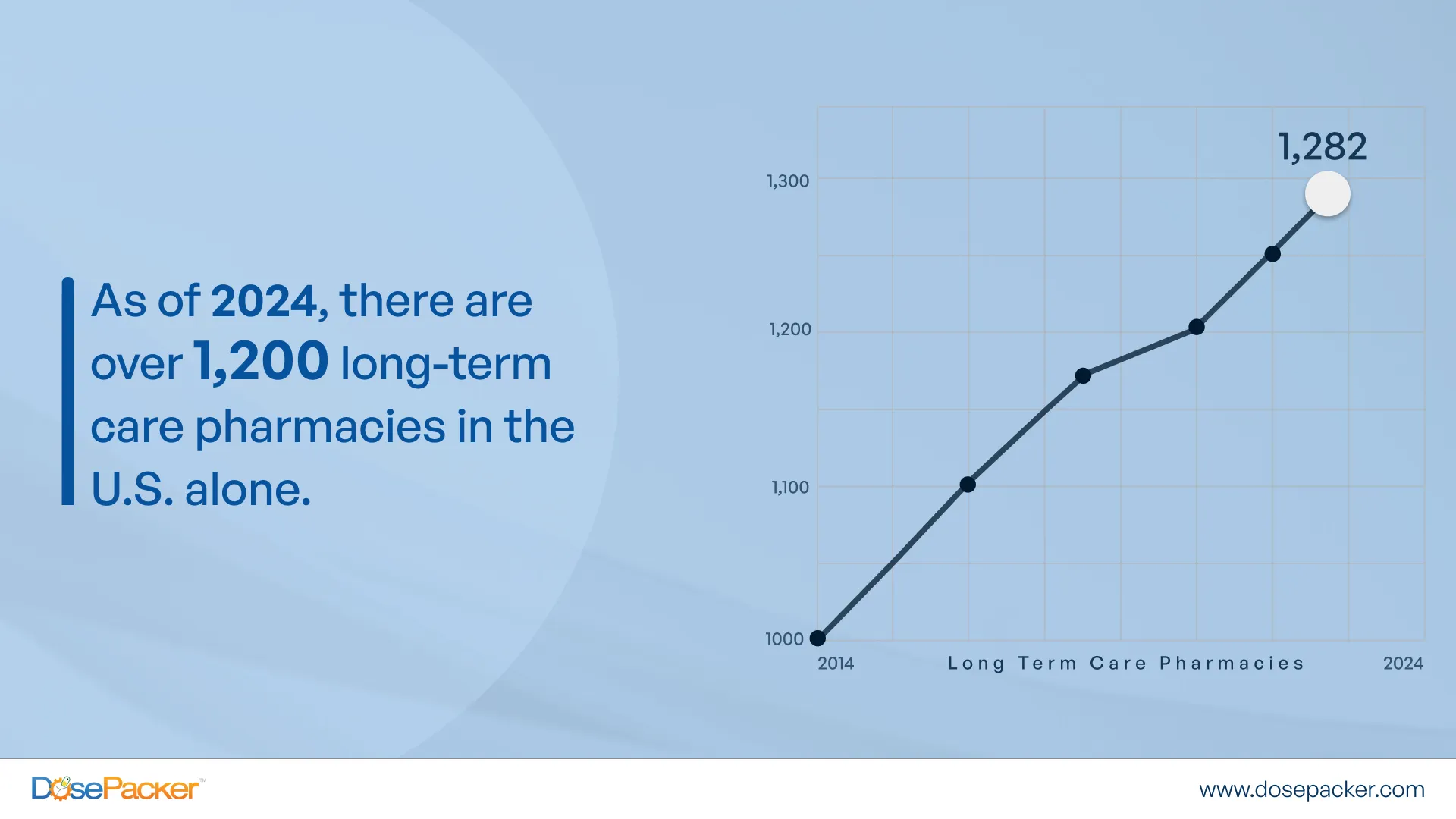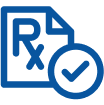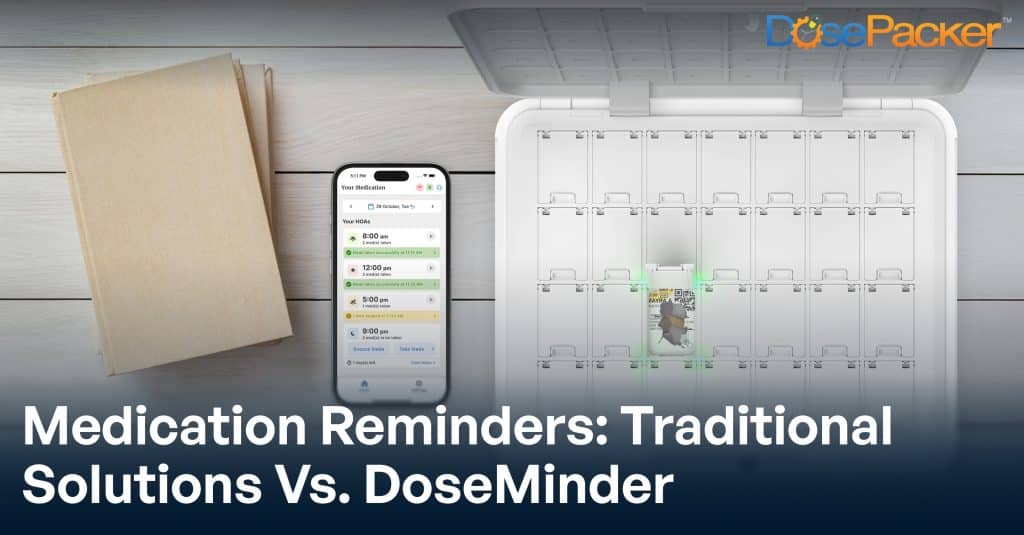Unlock the latest in medication management technology and grow your care community with us.

When caring for long-term care patients, are you confident in choosing the right type of pharmacy to meet their specific healthcare needs? As healthcare evolves, pharmacies’ roles have become more critical than ever, but not all pharmacies are the same.
Choosing between a long-term care (LTC) pharmacy and a traditional retail pharmacy can significantly impact the quality of care, operational efficiency, and overall patient outcomes. Understanding the differences is crucial for ensuring patients receive the proper care tailored to their needs.
Selecting the pharmacy that prioritizes personalized, high-quality care can make all the difference to your patient’s well-being. Using innovative solutions, DosePacker’s pharmacies ensure patients receive the necessary medications and support through improved medication management and operational efficiency.
Choose Better Care with DosePacker
What Is an LTC Pharmacy?

An LTC pharmacy specifically caters to the needs of residents in long-term care communities such as nursing homes, assisted living and rehabilitation centers. These pharmacies are designed to support the unique requirements of patients who need ongoing care and medication management.
The demand for these specialized pharmacies has been steadily increasing. As of 2024, there are over 1,200 long-term care pharmacies in the U.S. alone, highlighting the growing need for tailored pharmacy services.
Main Functions of an LTC Pharmacy
Long-term pharmacy care fulfills several critical roles to support the healthcare needs of residents, such as:
- Medication Management – LTC pharmacies manage medications for patients with chronic conditions to reduce medication errors and ensure they receive the correct dosages and combinations.
- Coordination with Healthcare Providers – They work closely with doctors, nurses, and other healthcare providers to create and manage treatment plans.
- Emergency Medication Services – They offer 24/7 emergency medication delivery services to address residents’ urgent medication needs and ensure continuity of care.
- Specialized Packaging and Delivery – Medications are often packaged to make them easier to administer and deliver directly to the care communities.
Benefits of LTC Pharmacy
Partnering with an LTC pharmacy offers numerous benefits for long-term care communities and their patients, including:
- Personalized Care – They offer tailored services to meet the specific needs of patients with complex health conditions.
- Improved Medication Adherence – LTC pharmacies help patients take their medications correctly by managing and simplifying medication schedules.
- Support for Healthcare Staff – LTC pharmacies provide valuable support to healthcare workers in facilities, helping them manage patients’ medications efficiently.
- Reduction in Hospital Readmissions – Proper medication management can lead to fewer complications and hospital visits, improving overall patient health and reducing costs.
These benefits collectively contribute to improved patient outcomes and overall quality of care within long-term care facilities.
What Is a Retail Pharmacy?

A retail pharmacy, or community pharmacy, serves the general public and is typically found in drugstores, supermarkets, or standalone stores. These pharmacies offer a wide range of medications and health-related products, making them easily accessible.
Like LTC pharmacies, retail pharmacies are projected to grow by more than 40% from 2022 to 2032 due to the increased need for medications for chronic conditions. Approximately 88.9% of U.S. citizens live near a pharmacy (within 5 miles), underscoring their importance as a vital community component.
Main Functions of Retail Pharmacy
Retail pharmacies perform essential functions to meet the healthcare needs of their customers:
- Dispensing Medications – Retail pharmacies fill prescriptions written by doctors, ensuring patients get the proper medication
- Offering Over-the-Counter Products – They provide non-prescription medications and health products like pain relievers, cold medicines, and vitamins.
- Health Consultations – Pharmacists offer advice on how to take medications, potential side effects, and general health concerns.
- Health Screenings and Vaccinations – Many retail pharmacies offer blood pressure checks, flu shots, and vaccinations.
Benefits of Retail Pharmacy
Utilizing the services of a retail pharmacy offers several advantages for individuals and the broader community, including:
- Accessibility – Retail pharmacies are conveniently located and easily accessible to the general public.
- Wide Range of Products – They offer a broad selection of health-related products beyond prescription medications.
- Personal Interaction – Customers can speak directly with pharmacists to get personalized advice and support.
- Convenience – Retail pharmacies often have extended hours and quick service, allowing patients to get their medications and other health products efficiently.
Long-Term Care Pharmacy vs Retail Pharmacy
Understanding the differences between LTC and retail pharmacies is crucial for patients, caregivers, and healthcare providers. Knowing which type of pharmacy best suits your needs can ensure better healthcare outcomes and more efficient medication management.
Here is a quick overview between the two:

Comparing these aspects shows how LTC and retail pharmacies have distinct yet equally important roles within the healthcare system.
The DosePacker Difference in Long-Term Care
A dedicated pharmacy is not just a service for exceptional long-term care; it’s a lifeline, and DosePacker Pharmacies are dedicated to providing the best care possible. Our specialized pharmacies are committed to improving patient outcomes through personalized medication management and pharmacy solutions.
Medication administration can be complex in nursing homes, assisted living communities, and other long-term care settings. That’s why we offer:
- Compliance Packaging Our specialized Compliance packaging makes managing medications easier for patients, long-term care facilities, and pharmacies.
- MyDoses Application A mobile app created to help patients, caregivers, and healthcare providers stay on top of medications.
- CareCommunityOS A comprehensive healthcare platform tailored to improve patient outcomes and streamline workflows for long-term care providers.
- DoseKart DoseBank, DoseMinder & DosePacker Storage
offer medication storage options to give care communities better control over medication storage and administration.
Our commitment to quality, safety, and personalized care sets us apart in the industry. Choose DosePacker Pharmacies for a reliable partner in managing your long-term care pharmacy needs and ensuring your residents receive the care they need.
Ensure the Best for Your Residents
Picking the right pharmacy is crucial for effective healthcare, whether for daily needs or specialized care. Each pharmacy plays a vital role in community health by offering services tailored to different patient needs.
LTC pharmacies provide medication management services to residents in long-term care facilities, collaborating closely with the healthcare team. Retail pharmacies, in contrast, offer a wide range of medications and health products alongside personalized consultations and quick service.
Understanding these differences helps individuals and healthcare providers make informed decisions that meet specific healthcare needs. Individuals can access tailored care that enhances health outcomes and promotes overall well-being by choosing the pharmacy partner that best meets their needs.
































